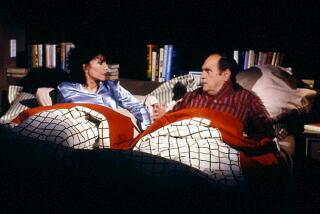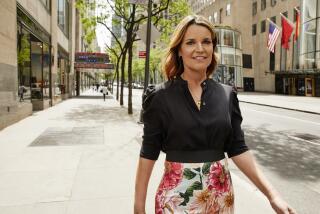Religion, Ethics Are Heart of Abernethy’s Beat
- Share via
Not long ago, Bob Abernethy was doing an interview with the director of a Muslim organization whose offices are a few blocks from the Washington studio where Abernethy’s PBS series, “Religion & Ethics Newsweekly,” is taped.
“We came to a particular time, and the whole office put the rugs down,” he recalled, in preparation for prayer.
Abernethy, a Protestant, was intrigued, and his interest became the catalyst for an upcoming segment about the significance of Muslim prayer rugs.
All in a day’s work for the thoughtful, silver-haired Abernethy, who served as an NBC News correspondent for more than four decades, including stints in London and Moscow.
Abernethy has been interested in religious practices since he was a boy growing up in the home of his paternal grandfather, a Baptist minister. In 1984, the veteran reporter, who holds two degrees from Princeton University’s Woodrow Wilson School of Public and International Affairs and is a trustee of the university, took a one-year leave from NBC to study theology and social ethics at the Yale Divinity School.
In September 1997, his effort to combine his interest in religion and his career as a television journalist resulted in “Religion & Ethics Newsweekly.” Now 72, he anchors reports from a stable of correspondents including regulars Mary Alice Williams, Ruben Martinez, Lucky Severson, Betty Rollin, Judy Valente and Kim Lawton, who also is managing editor and news director. Arnold Labaton, a founding executive of PBS who served as its first director of operations, is executive producer. Williams and former NBC correspondent John Dancy also fill in as anchors so Abernethy can do some reporting of his own.
All of them, said Abernethy, “have dreamed of some way to combine journalism and religion.”
According to a recent study from the Center for Media and Public Affairs and the Ethics and Public Policy Center, there is more interest in religion on the part of other journalists, too.
The 1969-1998 study, tracking coverage in the Washington Post, the New York Times, Time, Newsweek, U.S. News & World Report, and ABC, NBC and CBS evening newscasts, said stories about religion doubled from the 1980s to the 1990s, with a sharp increase in focus on Eastern religions such as Buddhism and Hinduism and newer movements such as Children of God, Hare Krishna and the Unification Church. It also found that the proportion of journalists at major media outlets who regularly attend religious services has more than doubled.
But the study showed that coverage of religion and spirituality is thinner on television than in the print media, with ABC--the only network with a religion reporter, Peggy Wehmeyer--topping NBC and CBS. But “R&E;” has a niche of its own.
Its challenge now is to find viewers. PBS stations carrying it reach nearly 80% of Americans, but the stations are free to air the show whenever they want. Nielsen Media Research rates the show 0.6 in metered-large-markets, 0.3 overall; an average show this season drew about 350,000 viewers.
In addition to news about religion, Labaton and Abernethy say “R&E;” will wade deeper into stories involving ethics.
A Wide Array of Subject Matters
Past installments have looked at late-term abortion, assisted suicide, relations between the United States and Cuba, tensions among other nations, artificial intelligence, sexual abuse by the clergy, ethics in sports and the sale of organs for transplant, among others.
Upcoming are a report about the reluctance of some physicians and hospitals to operate on elderly patients, and a story from Steve Ehrlanger of the New York Times about the role of churches and religious leaders in Kosovo.
“One of the great opportunities of this program is its ability to cover a variety of subjects,” Labaton said. “Ethics issues are profoundly important, surprising as you explore them and important to do.”
Abernethy agrees: “I think ethics stories are wonderful. Every family faces difficult choices: Sick and aging parents. Premature babies born with terrible defects who can be kept alive. Euthanasia. We’re not saying here’s how somebody should decide what to do, but here are the principal arguments, and not just from the point of view of philosophical ethics, but religious ethics too.”
In a way, hosting a series about religion has brought Abernethy home. After his father, Robert William Abernethy, a teacher, died at 29, young Bob and his mother, Lois, moved in with his father’s parents, William and Jane. The Rev. Abernethy was pastor of Calvary Baptist Church in Washington.
“He was a good preacher, a good man,” Abernethy recalled.
Today, Bob Abernethy is a member of the United Church of Christ--”the most liberal of all Protestant denominations,” he said--and his wife of 16 years, Mary, is a member of the Russian Orthodox Church. Fluent in five languages, including Russian, she accompanied him on his NBC posting to Moscow.
They attend each other’s religious services, he said, adding: “She doesn’t go as often as I go, but always with a complete sense of being at home.”
Such religious diversity makes life interesting, he thinks, especially in this country, where all religions are permitted by law. But that diversity also makes religious reporting more difficult.
“We’re all conscious of what an enormous task we have taken on, trying to cover what’s new in all the major religions,” he said. “We think, quite immodestly, that we’ve learned a lot in these three years, but still there’s no one of us who knows it all. Producers, reporters, we all need the gaps in our knowledge filled by others. Sometimes we can do it within our group. We have terrific consultants who meet with us to help us with things we don’t know. And we have evolved a very collegial editing process. Lots of people get in on the review because we want different people’s ideas. The result is always an improvement, and I say that as a reporter.”
‘Respectful of the Religious Impulse’
Still, it is the show’s “attitude,” said Abernethy, that has endeared it to its sponsor, the Lilly Endowment, which funds efforts in the field of American religion. The Laurance S. Rockefeller Fund also provides additional financial support.
“We are upfront, straightforwardly respectful of the religious impulse,” he said. “We think it’s an important part of life. If we didn’t, we wouldn’t be here. We take seriously that there is a spiritual dimension to life. Finding this line between sensitivity to the spiritual dimensions of a story on the one hand and objective, traditional skepticism is a constant struggle and a very appropriate one, but I think we’ve got it right. This is a matter of good reporting. Unless you get the spiritual element of the story, you’re missing something very important. It’s like interviewing Babe Ruth and not asking about hitting.”
Given its subject, which matters a great deal to many people, the show is notable for the lack of criticism aimed at it, Abernethy said.
“I think some folks have a concern that the national media--from their point of view, the liberal media, the secular media--don’t understand what they’re up to and therefore couldn’t possibly do a fair job.”
But he also thinks it’s the unusual nature of the show that also is its shield.
“People who care a lot about spiritual life are so glad that the program is on at all, they cut us some slack, I think,” he said.
* “Religion & Ethics Newsweekly” airs Sundays at 10 a.m. on KCET-TV.
More to Read
The complete guide to home viewing
Get Screen Gab for everything about the TV shows and streaming movies everyone’s talking about.
You may occasionally receive promotional content from the Los Angeles Times.






